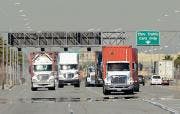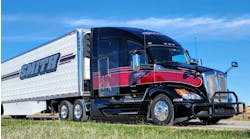PierPass Inc announced that its OffPeak program has reached a major milestone, diverting its 30 millionth truck trip from weekday, daytime traffic in Los Angeles and Long Beach CA since the program began in July 2005.
OffPeak has greatly eased congestion on city streets and nearby freeways, and reduced emissions from trucks idling outside of terminals and in traffic.
On an average OffPeak weeknight, 17,000 trucks visit the marine container terminals at the Port of Los Angeles and Port of Long Beach. If all these trucks were lined up bumper-to-bumper, they would form a line 170 miles long, half the distance from Los Angeles to San Jose CA. Without the OffPeak program, this cargo would be crammed into a single-day shift, more than doubling daytime volumes and causing major congestion.
Under the OffPeak program, the 13 international container terminals at the two adjacent ports operate additional shifts on nights and Saturdays. Over the past nine years, PierPass OffPeak gates have grown to handle about 55% of daily truck-borne container traffic at the port complex.
The OffPeak program has nearly doubled the capacity of the Ports of Los Angeles and Long Beach. Substantial unused capacity remains available at the ports within current hours of operation. A large proportion of the trucks serving the ports work only a single shift, spanning the second half of the day shift and the first half of the night shift. Lines are typically short or non-existent during mornings and after 11 pm.
“The terminals here have been delivering cargo reliably and without major disruptions since the 2004 congestion crisis that led to the creation of PierPass,” said Bruce Wargo, PierPass president and chief executive officer.
The Ports of Los Angeles and Long Beach have seen none of the disruptions experienced by other large North American and European ports over the past year. While all import and export containers at the two ports are being delivered, the terminals have been managing through pressures caused by disruptions in industry segments involved in cargo movement:
•Huge new ships have begun calling at the ports, each carrying 50% or more containers than ships carried just a few years ago.
•Chassis have often been in short supply since shipping lines began transferring chassis ownership to leasing firms.
•Railroads that move about half of all containers in and out of the terminals have been late providing locomotives and railcars to the terminals as they struggle with nationwide capacity shortages.
The average in-terminal turn time—the amount of time it takes a truck to drop off or pick up a single container—in the first half of 2014 was 42 minutes, up 7.7% from the first half of 2013. Adding the average 20 minutes in queue outside the terminals, the typical single transaction takes about one hour.
“While port congestion has increased worldwide, the Ports of Los Angeles and Long Beach are handling these pressures better than most of the other major ports in North America and Europe,” said Wargo. “One reason LA/Long Beach works is because the PierPass OffPeak program nearly doubled the capacity of the ports in 2005, with no taxpayer funding.”
To learn what it takes for a truck to drop off or pick up a container at a marine terminal, see http://youtu.be/P9IJN1yIIJ4. For additional information, access www.pierpass.org.
Voice your opinion!
Voice your opinion!
To join the conversation, and become an exclusive member of FleetOwner, create an account today!
Latest from Refrigerated Vehicles & Equipment
Latest from Refrigerated Vehicles & Equipment




